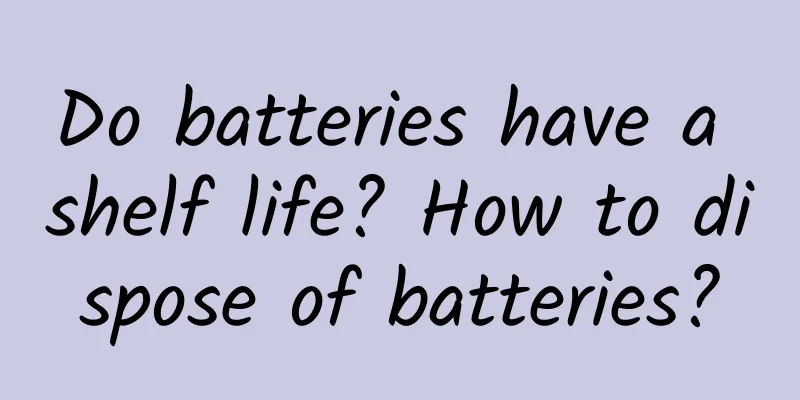Do batteries have a shelf life? How to dispose of batteries?

|
Batteries have positive and negative electrodes. The performance parameters of batteries mainly include electromotive force, capacity, specific energy and resistance. In 1890, Edison invented the rechargeable iron-nickel battery. Common batteries include: dry batteries, storage batteries, and lithium batteries. Dry batteries are also called manganese-zinc batteries, and their voltage is 1.5 volts. Storage batteries are one of the most widely used batteries. It is a common item in our lives. Do many friends and curious batteries have a shelf life? Let's find out below. Contents of this article 1. Does the battery have a shelf life? 2. How to dispose of batteries? 3. What kind of garbage do dry batteries belong to? 1Do batteries have a shelf life?Batteries have a shelf life. The shelf life of alkaline batteries is more than three years, while the shelf life of ordinary batteries is only one year. In addition, batteries are classified into four types according to electrolytes, namely alkaline, acidic, neutral, and organic electrolytes. When purchasing batteries, you should choose those with the national inspection exemption mark, neat appearance, and recently produced varieties. 1. Has a shelf life Batteries have a shelf life, and different types of batteries have different shelf lives. Alkaline batteries can generally be stored for three years, while ordinary batteries can only be stored for one year. In the process of storing batteries, they should be placed in a dry, ventilated, and light-free area to prevent corrosion of the battery case. 2. Purchase method When purchasing batteries, you should observe the packaging and instructions. It is best to choose products with the national inspection exemption mark or well-known brands. During the purchase process, you should also check the battery's production date, shelf life and packaging. It is more appropriate to choose batteries with a recent production date and exquisite packaging. 3. Product classification Batteries are divided into four types according to the electrolyte: alkaline batteries, acid batteries, neutral batteries, and organic electrolyte batteries. The electrolyte in alkaline batteries is mainly KOH, the electrolyte in acid batteries is aqueous sulfuric acid solution, and the electrolyte in neutral batteries is salt solution. 2How to dispose of batteriesThe environmental protection department said that household batteries have met the national low-mercury or mercury-free technical requirements and can be disposed of separately with daily household waste without centralized recycling. If there is an old battery repurchase organization near your residence, you can also send it there. Note: Button batteries, electric vehicle batteries and other lead-acid batteries and nickel-cadmium batteries still need to be recycled. A battery is a device that contains an electrolyte solution and metal electrodes to generate an electric current in a cup, tank or other container or part of a composite container that can convert chemical energy into electrical energy. Batteries have positive and negative electrodes. The performance parameters of batteries mainly include electromotive force, capacity, specific energy and resistance. In 1890, Edison invented the rechargeable iron-nickel battery. Common batteries include: dry cell, storage battery, lithium battery. Dry cell is also called manganese zinc battery, with a voltage of 1.5 volts. Storage battery is one of the most widely used batteries. 3What kind of garbage do dry batteries belong to?Dry batteries are hazardous waste. In daily life, the dry batteries people usually use are zinc-manganese batteries, which contain highly toxic mercury. In addition, zinc is also a harmful substance that can cause environmental pollution to the air, water sources, soil, and other places, and harm the growth of organisms and crops. Dry cell batteries are disposable batteries and belong to the primary battery class of chemical power sources. They are suitable for flashlights, radios, cameras, toys, etc. They are also widely used in various fields of national construction such as national defense, telecommunications, aviation and navigation. Hazardous waste mainly refers to discarded batteries, waste light bulbs, waste medicines and other household waste that are harmful to human health and pollute the natural environment. When placing hazardous waste, please pay attention to sealing the package and placing it in the hazardous waste bin. |
<<: How to choose jackfruit? The edible value of jackfruit
>>: Can batteries be checked in? How to restore a lithium battery after it runs out of power?
Recommend
Vaginitis medication
Vaginitis is a common disease in our lives. It is...
The calorie content of sticky corn and sweet corn is nearly twice as much! 8 truths about corn explained at once →
Corn is a coarse grain that many people who are t...
Why is the chest pain getting bigger?
Some people often feel chest pain, and even their...
When a baby grows "milk teeth", how should parents deal with it?
What is "horse teeth" Some babies will ...
Frequently letting this thing enter the body can actually protect the uterus
The uterus is an important reproductive organ for...
Is occult blood in women's urine serious?
Many people don't understand the physical exa...
The little hair of a woman actually hides great power
Every part of the body has its function. The pubi...
How to relieve period pain
It is a very painful process for girls when they ...
Are gynecological diseases related to men?
Gynecological diseases usually have nothing to do...
What causes girls to snore?
I believe everyone is familiar with the phenomeno...
The harm of uterine fibroids is actually these
Uterine fibroids are a common benign tumor. The in...
What causes white hair at the age of 40?
Under normal circumstances, women will have some ...
Women's Health: Things About the Cleanliness of Vaginal Discharge
Vaginal secretions are fluids secreted by the fem...
How to turn on an OPPO phone if the power button is broken? How to set the font size on an OPPO phone
The mobile phone itself is an electronic product,...









